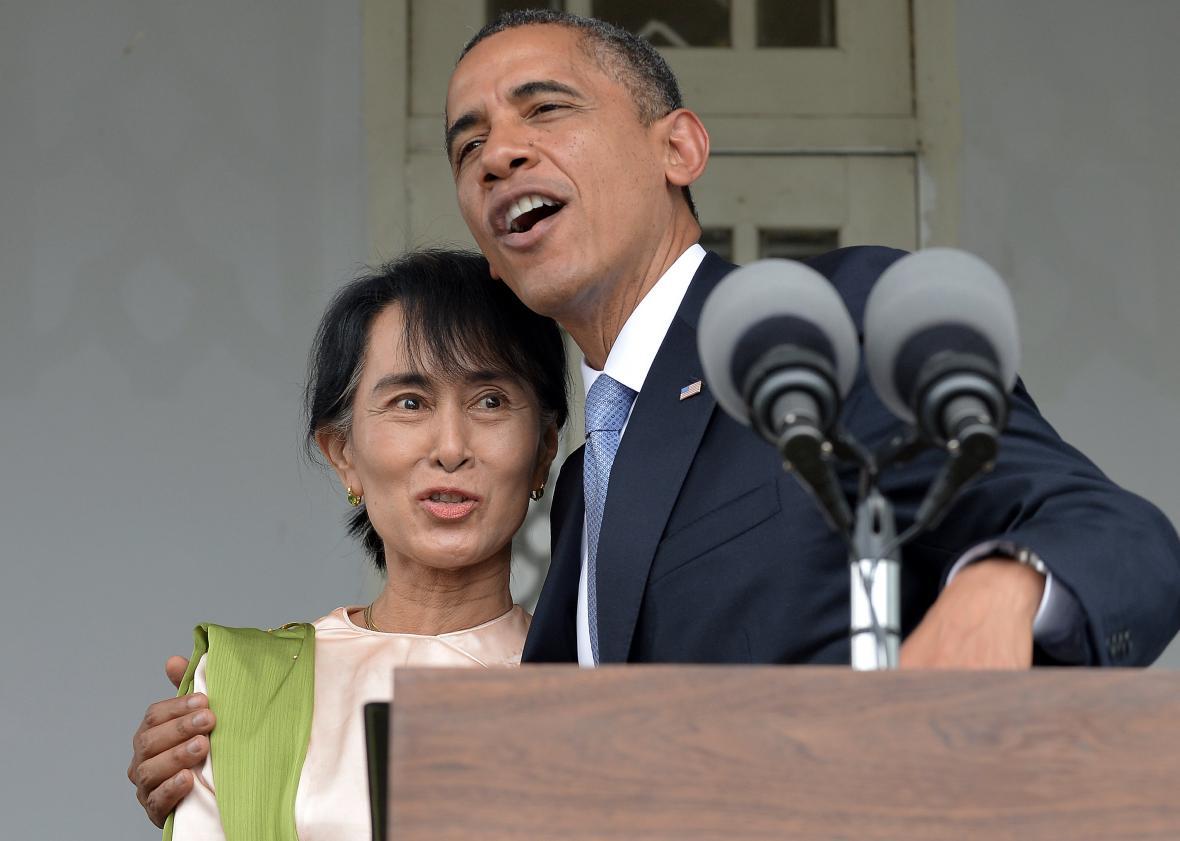A humanitarian disaster is developing on the Myanmar-Bangladesh border, where 164,000 Rohingya refugees have crossed in the past two weeks. The Rohingya, a Muslim ethnic group from Myanmar’s western Rakhine state, say they are fleeing massacres and the burning of their villages by the military and non-Rohingya locals. U.N. officials believe as many as 1,000 people may have been killed. Accounts by journalists in the area and satellite imagery bolster these claims, but the government of majority-Buddhist Myanmar—which does not recognize the Rohingya as one of the country’s official ethnic groups or consider them citizens—says that it’s merely carrying out counterterrorism operations in response to recent attacks on police posts by Rohingya extremists and that the Rohingya are burning their own villages.
The latest abuses against the Rohingya, sometimes called the “world’s most persecuted minority,” has sparked condemnation from Muslim governments. Malaysia and Indonesia have taken the lead in pressuring Myanmar, a fellow member of the Association of Southeast Asian Nations. Turkish President Recep Tayyip Erdogan has called the violence against the Rohingya a genocide. (Some of the condemnation, it must be noted, is pretty self-serving: Chechnya’s strongman leader Ramzan Kadyrov, who lamented that he can’t call a “nuclear strike” on Myanmar, is in no position to criticize anyone’s human rights practices.)
Western countries have been slower and more hesitant to respond. The U.S., in particular, has done little more than issue boilerplate statements of concern. In part, this is because attention is focused elsewhere: primarily at the nuclear standoff on the Korean peninsula. There’s also little appetite in Western countries to take up the cause of yet another large, desperate population of Muslim refugees. (During the most recent major Rohingya refugee crisis in 2015, then–Prime Minister Tony Abbott famously replied “nope, nope, nope” when asked if some of them would be resettled in Australia.*)
But the events of recent years may have also made Western governments reluctant to criticize Myanmar, and in particular its dynamic leader, Aung San Suu Kyi. “The Lady” became an international celebrity during the 20 years she mostly spent under house arrest after being denied by Myanmar’s military junta her rightful victory in the 1990 election. She was awarded the Nobel Peace Prize in 1991. Dignitaries traveling to Myanmar, including Barack Obama and Hillary Clinton, not to mention a “star-struck” Bono, made a point of visiting her home to demonstrate support for human rights in the country. When she was released from house arrest in 2010 and later allowed to run for office again as part of the once-isolated dictatorship’s opening to the outside world, it was considered a victory of diplomacy and sanctions policy and a rare win on human rights for the Obama administration. A technicality prevents Suu Kyi from becoming president, but when her party won a landslide victory in the 2015 election, the new position of state counselor was created to make her the de facto head of government; she seemed destined to join the rarefied ranks of Nelson Mandela and Vaclav Havel, longtime opposition leaders finally given the chance to lead their countries into a new era.
So it’s beyond discouraging to see how Suu Kyi has responded to the act of ethnic cleansing happening under her watch, blaming the whole affair on “a huge iceberg of misinformation”—fake news, essentially—spread by terrorists.
There have been calls, unlikely to bear fruit, for Suu Kyi’s Nobel to be revoked. But more concerning than one leader’s legacy or the damage to the Norwegian Nobel Committee’s already-dubious credibility is the possibility that the cult of Aung San Suu Kyi may be making world leaders slow to acknowledge what’s going on and even slower to act. As analyst Herve Lemahieu of Australia’s Lowy Institute suggested to CNN, “People, particularly in the West, are torn between their affection with the cause of Aung San Suu Kyi and then the very gory reality.”
Suu Kyi’s case ought to be an object lesson in the danger of reducing world leaders to one-dimensional heroes or villains. Western leaders and credulous journalists all too often give media-savvy leaders with inspiring narratives like Liberia’s Ellen Johnson Sirleaf or Rwanda’s Paul Kagame a pass on autocratic or corrupt behavior. And conversely, turning the Kim Jong-uns of the world into supervillains, however much they may deserve it, is not often useful in resolving crises. Unfortunately, the current U.S. president seems highly susceptible to assuming that leaders he likes personally can do no wrong.
Most political leaders are acting in what they see as their own or their constituents’ interests, informed by their own local context. It shouldn’t be surprising that one woman can be both a forceful advocate for majority rule in her country and share that majority’s attitude toward a persecuted minority.
*Correction, Sept. 7, 2017: This post originally misspelled Tony Abbott’s last name.
